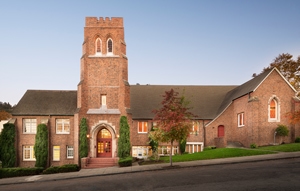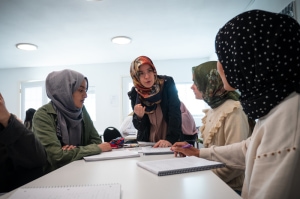BA Arabic Course Descriptions
Arabic in the BA Program
Goals of the Department
-
To teach the Arabic language to non-native speakers in a non-Arabic environment, and to connect it to the broader context of Islamic studies
-
To help students gain access to classical Arabic sources by teaching them the most important elements, skills, and theoretical points of Arabic grammar
-
To prepare graduates to become fluent readers of a variety of traditional literature in Arabic, and in general, to gain a broad appreciation of Islamic literature
-
To contribute toward the development of the skills and knowledge necessary to be effective writers and speakers of the Arabic language
Summer Before Freshman Year
Beginning Arabic
The Summer Arabic Intensive (SAI 1) Program introduces students to Modern Standard Arabic. Following a proficiency-oriented teaching method, it aims to help students achieve elementary-level competence in listening, reading, speaking, and writing and to introduce them to various aspects of Arab and Islamic culture through the curriculum of Al-Kitaab, Part *and various multimedia. The Arabic grammatical tradition receives special consideration by focusing on morphology, syntax, and oral competence, as developed through extensive use of reading exercises and small-group conversation practice. This course is usually given as an intensive course in the summer.
Note: Students who pass the Arabic Language Placement Test upon enrollment do not have to take SAI 1.
COURSE OBJECTIVES AND LEARNING OUTCOMES
Upon successful completion of the course, students should be able to:
-
Employ a wide range of frequently used Arabic vocabulary
-
Write comprehensible short passages and letters
-
Make brief oral presentations entirely in Arabic, using authentic expressions
-
Demonstrate comprehension of short Arabic passages on specialized topics
-
Display knowledge of fundamentals of Arabic morphology (i.e., verb conjugation, noun declension, word derivation, and memorization of the ten verb forms)
-
Display elementary command of proper Arabic inflection
-
Converse in Arabic using short statements and discrete sentences in straightforward social settings
Freshman Year
Intermediate Arabic 1 and 2
This two-semester course is a continuation of the SAI Program and therefore aims to help students achieve intermediate-level competence in listening, reading, speaking, and writing. The proficiency-oriented teaching method employs both written and audio-visual materials to teach various aspects of Arab and Islamic culture. Further emphasis is placed on the Arabic grammatical tradition, with a focus on morphology, syntax, and oral competence, as developed through extensive use of reading exercises and small-group conversation practice.
This course also aims to develop students’ competence from intermediate-low to intermediate-mid level in both productive skills (speaking/writing) and receptive skills (reading/listening). In addition, emphasis is placed on acquiring intermediate translation skills, as well as knowledge of cultural and religious topics.
COURSE OBJECTIVES AND LEARNING OUTCOMES
Upon successful completion of the course, students should be able to:
-
Demonstrate knowledge and understanding of a wide range of Arabic vocabulary and the appropriate use of various linguistic structures and cultural expressions in a given context
-
Demonstrate knowledge and understanding of intermediate Arabic grammar, focusing on proper Arabic inflection and achieving a comprehensive view of the Arabic case system: nominative, accusative, genitive, and jussive
-
Demonstrate knowledge and understanding of intermediate Arabic morphology (i.e., verb conjugation, noun declension, and word derivation)
-
Understand and engage in spoken discourse of medium complexity on specialized topics, including current events, matters of public/community interest, and religion
-
Comprehend select verses from the Qur’an and traditions from the hadith canon
-
Compose passages in written Arabic of medium length on specialized topics
Summer Before Sophomore Year
Intermediate Arabic 3
This course consists of a systematic study of standard Arabic morphology (¢ilm al-ta?r?f) and grammar (¢ilm al-na?w) through Al-?jarr?miyyah, a
comprehensive classical text by Ibn ?jarr?m. The course emphasizes the application of grammatical knowledge of morphological forms and syntactic declension to a close linguistic reading of
the Qur’an and authentic Islamic literature across a variety of disciplines. This course is usually given as an intensive course in the summer.
Note: This course is mandatory for Zaytuna students.
COURSE OBJECTIVES AND LEARNING OUTCOMES
Upon successful completion of the course, students should be able to:
-
Demonstrate knowledge and understanding of intermediate Arabic grammar and morphology
-
Display firm understanding of the parts and signs of inflection, inflected words, verb tenses, and parts of speech
-
Display knowledge of the inflection states of nouns: nominative, accusative, genitive, and jussive
-
Apply their knowledge and display mastery of all the above skills by using the right diacritical marks on words and by analyzing sentences while reading, writing, and listening to various types of passages and texts
Arabic Qualifying Exam
At the end of the summer, students must pass an Arabic qualification exam with a grade of 85 percent or higher to proceed to the sophomore year. This exam assesses students’ readiness for the rest of the BA program and covers all the Arabic courses they have taken so far (Beginning; Intermediate 1, 2, and 3). Students who do not pass this exam are dismissed from the program. Nonetheless, having completed the equivalent of three years of Arabic study, departing students receive a certificate of recognition indicating intermediate-level proficiency in Arabic.
Sophomore Year
Arabic Grammar and Texts 1 and 2
This two-semester course gradually increases the level of immersion in an Arabic environment. This intermediate-high course reviews all the grammatical rules learned in previous courses through the reading of intermediate-high-level MSA texts, completing Al-Kitaab, Parts 2 and 3. Instruction emphasizes the application of grammatical and morphological rules and comprehension, with the goal of cementing these rules while advancing students toward Arabic language proficiency. Emphasis is on vocabulary building, which is acquired through reading, writing, and participating in classroom discussions.
COURSE OBJECTIVES AND LEARNING OUTCOMES
At the end of the course, students should be able to:
-
Demonstrate intermediate-high-level knowledge and understanding of Arabic grammar and morphology
-
Display familiarity with noun declension and verb conjugation, roots, word types, and common patterns
-
Exhibit knowledge and understanding of a range of MSA vocabulary
-
Understand inflection and its signs
-
Understand passages written and presented in intermediate-high-level Arabic
-
Translate at an intermediate-high level
-
Estimate a new word’s meaning by using contextual clues
-
Develop listening skills to benefit from the vast amount of related MSA materials
-
Develop writing skills to compose essays at an intermediate-high level
-
Develop speaking skills to participate in discussions at an intermediate-high level
Junior Year
Arabic Text Study 1 and 2
In Arabic Texts 1, students read selections from the great works of Islamic civilization including but not limited to standard lexicons, exegeses (taf?s?r), hadith commentaries, biographical compilations, juridical responsa, and various subgenres of classical literature (?d?b). Through linguistic and literary analysis, students develop the skills for accurate reading and comprehension, with emphasis on vocabulary acquisition, fluid orthophonic recitation, and linguistic competence.
Students develop skills, such as theme identification and a range of other logical approaches, they can use for the systematic analysis of Arabic written texts. Special emphasis is placed on the process of extracting and constructing meaning from various texts, as well as vocabulary acquisition, critical reading skills, and study skills.
COURSE OBJECTIVES AND LEARNING OUTCOMES
-
At the end of the course, students should be able to:
-
Demonstrate knowledge and understanding of advanced-low-to advanced-mid-level Arabic grammar and morphology
-
Display functional familiarity with methods used to analyze texts
-
Select suitable methods to conduct research
-
Demonstrate critical reading and logic when assessing concepts within a text
-
Display advanced reading, study, and comprehension skills
-
Identify the main idea and supporting ideas in a text
-
Write essays and reflection papers in Arabic at an advanced-low to advanced-mid level
-
Determine the author’s purpose and tone
-
Distinguish between fact and opinion
-
Use context clues to clarify the meaning of words
-
Exhibit knowledge and understanding of a range of modern Arabic and classical Islamic vocabulary
-
Identify logical inferences and conclusions
Senior Year
Arabic Rhetoric and Literature
This is an introductory course in the science of eloquence (¢ilm al-bal?ghah), as crystallized in the thirteenth century CE into three branches—namely, (+) the science of meanings (¢ilm al-ma¢?n?), focusing on the role of syntax in literary beauty; the science of elucidation (¢ilm al-bay?n), covering simile, metaphor, and metonymy; and (E) the science of rhetorical figures (¢ilm al-bad?¢), as presented in Dur?s al-bal?ghah, by ?anaf? N???f, Mu?ammad Diy?b, Mu??af? Tamm?m, and Sul??n Mu?ammad. Building upon the previous study of diction, morphology, and syntax, theoretical knowledge is augmented with a rhetorical analysis of selections from the Qur’an, prophetic traditions, and select genres of classical poetry and prose.
COURSE OBJECTIVES AND LEARNING OUTCOMES
At the end of the course, students should be able to:
-
Recognize varying stylistic devices within oral and written discourse
-
Apply rhetorical analysis to a given document through tools learned in courses on grammar and style
-
Reference specialist Arabic lexicons, i¢j?z al-Qur’?n writings, and philological works within fiqh al-lughah
-
Appreciate the beauty and sophistication of Qur’anic style, prophetic discourse, and the classical poetic canon
-
Better understand the syntactic governance (¢amal) of Arabic words
-
Explore the art and function of Arabic oration in its foundational period (seventh to eighth centuries AD)
Senior Arabic Seminar
This seminar involves student-led discussions about a variety of advanced Arabic texts across disciplines and literary genres. Students may use this opportunity to share texts they found useful for their senior thesis or texts that reflect their particular interests from any time, place, and genre within the Arabic literary landscape.
COURSE OBJECTIVES AND LEARNING OUTCOMES
At the end of the course, students should be able to:
-
Display proficiency in grammar and morphology
-
Conduct research in Arabic using the library, online sources, or both
-
Present as well as conduct a discussion in Arabic
-
Understand passages written and presented in Arabic on some specialized topics
-
Produce essays using persuasive writing skills
-
Demonstrate advanced analytical and critical thinking skills and exhibit oral presentation skills
Advanced Arabic Program
Advanced students will remain members of their cohort (the group of students who enter in the same year) but will be excused from parts of the MSA curriculum, based on their level, as determined by performance on Advanced Arabic Placement (AAP) exams.
AAP exams can be taken at the beginning of each year (usually during Orientation week, exact dates to be announced each year); a request should be submitted in advance to the Admissions Office. AAP exams are designed to test students on topics taught in each year of the MSA curriculum. Students must get a score of 85 percent or higher on the corresponding AAP exam to be excused from a specific year.
Students must complete all parts of the MSA curriculum they are not excused from before taking part in the Advanced Arabic Program. If students finish the Arabic requirement before their senior year, they should consult with the director of the Arabic Language Program.



